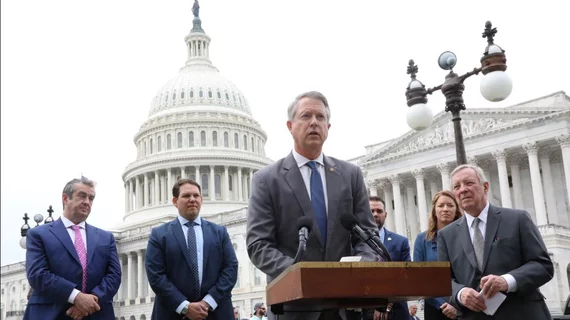Senators introduce radiologist-backed bill to punish payers for ignoring No Surprises Act rulings
Bipartisan members of the U.S. Senate on Monday introduced radiologist-supported legislation to punish health insurers who fail to pay up under the No Surprises Act.
Sens. Roger Marshall, MD, R-Kan., and Michael Bennet, D-Colo., have unveiled the NSA Enforcement Act after representatives proposed a similar House bill in September. The measure would close “enforcement gaps” under the landmark legislation, increasing penalties for health insurers that refuse to issue payment after losing disputes over out-of-network care.
Medicare has received over 16,000 grievances under the NSA, which went into effect in 2022. Top complaints against health plans included issuing late reimbursement after disputes were resolved and failure to conform with requirements to pay up (or issue a notice of denial) within 30 days.
“The idea that health insurers are breaking the law and unfairly punishing patients and providers is beyond the pale,” Marshall, who practiced as an OB-GYN specialist before joining Congress, said in a statement. “Our legislation ensures that out-of-network medical bills are resolved promptly and fairly, with enhanced penalties for any failure by the health insurers to do so.”
In addition, the NSA Enforcement Act would increase transparency in reporting requirements and provide “parity between penalties imposed against parties noncompliant with statutory patient protection provisions.” In September, the American College of Radiology, American College of Emergency Physicians and the American Society of Anesthesiologists voiced support for the House version of the bill. The three medical societies have banded together in recent years to advocate on policy related to surprise billing.
“There is a real need for accountability after disputes are resolved under the No Surprises Act, because right now insurance companies are often just not paying,” Alan Matsumoto, MD, chair of the ACR Board of Chancellors, said in September. “This situation may leave clinicians in financial peril, which in turn threatens the access to care for patients that the No Surprises Act was supposed to protect.”

